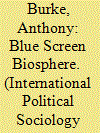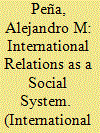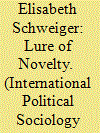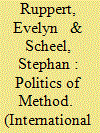|
|
|
Sort Order |
|
|
|
Items / Page
|
|
|
|
|
|
|
| Srl | Item |
| 1 |
ID:
168415


|
|
|
|
|
| Summary/Abstract |
From the social contract theory of Hobbes and Locke to the United Nations Charter, the sovereign state has formed the fulcrum of political order and law. Yet in the Anthropocene, this humanist political containment fails to grapple with humanity's dangerous enmeshment with the ecological systems of planet Earth. This article addresses one aspect of this dilemma by focusing on the international law and governance of biodiversity, which presents a “blue screen” biosphere: a material simulation that enables a double disappearance of biodiversity from the text of international law and from the actuality of the world. Through a critique of the figure of the “natural resource,” the article finds that the founding texts of international environmental law entrench a twofold humanism-as-statism that simultaneously supports the geopower of the state to facilitate the capitalist appropriation of the nonhuman and imports the modern metaphysics of the human domination of nature into international customary law. Such legal-political ontologies block a path to a more hopeful system of global ecological law and governance based on the “rights of nature” that might be able to honor the intrinsic value of the biosphere as a rich, agentic, and communicative whole, fundamental to the Earth's survival.
|
|
|
|
|
|
|
|
|
|
|
|
|
|
|
|
| 2 |
ID:
168413


|
|
|
|
|
| Summary/Abstract |
This article explores the professional construction of the space of Global Health. I argue that the growth of Global Health as a field of practice does not merely indicate an intensification of North-South intervention. It is also a professional project of reimporting lessons from the South to countries in the North. I focus on the emerging didactic regime for Global Health in US medical education and the deterritorialized “global” lessons that students are taught in poor countries. By rescaling these lessons to precarious settings at home, the space of Global Health is reterritorialized as a Global Medical South stretching into the United States, reinforcing the perception that health is not a right but a privilege. The analysis is based on a content analysis of university websites and didactic handbooks and a sample of sixty-four articles evaluating the education effects of study abroad experiences. It reveals an emerging canon of Global Health virtues and the construction of domestic scales for Global Health practices, which are based on ethnic and socioeconomic categories. This analysis of professional projects as spatial projects sheds new light on the geography of Global Health and of professional globalization more generally.
|
|
|
|
|
|
|
|
|
|
|
|
|
|
|
|
| 3 |
ID:
168411


|
|
|
|
|
| Summary/Abstract |
Against current developments in the sociology of IR, from new systemic theorizations of world society to Bourdieusian approaches to the practices of IR scholars, this article claims that relevant problems remain regarding how IR theorizes its social location and reconciles the social character of the world it observes with the social character of its observations. To reformulate these problems, the article draws from an underused paradigm of social system theorizing, sociocybernetics, offering a radical constructivist treatment of the problem of observation and reflexivity. Elaborating the notion of second-order cybernetics and Niklas Luhmann's take on the reproduction of observing social systems, the article argues that IR can be conceived as an observing social system that adapts by altering and subdividing the semantic boundaries of its systemic communications, that is, IR theories. This socio-heuristic process structures both the first-order observations IR makes about the world, as well as second-order observations of itself. In this manner, the article argues that sociocybernetics-informed sociology of IR communications can contribute to a more nuanced understanding of IR as a social system that observes society from society.
|
|
|
|
|
|
|
|
|
|
|
|
|
|
|
|
| 4 |
ID:
168412


|
|
|
|
|
| Summary/Abstract |
The concept “targeted killing” has been increasingly adopted in scholarship, policy, and media discourses, particularly in the context of US armed drone attacks. While “targeted killing” is often understood as something new, there are strong historical continuities with more traditional concepts such as “assassination” and “extra-judicial execution,” as well as with the colonial concept “police bombing.” This paper builds on an analysis of over nine hundred Security Council debates, Human Rights Council reports, legal papers, and policy documents. Tracing the conceptual continuities, I argue that the peculiar novelty of “targeted killing” does not mainly stem from the novelty of the practices and claims it describes but from the contradictory modes in which the term has been used, which has problematic repercussions for recent counterterrorism discourses. Posed as a new category that reacts to a new situation, the adoption of the concept “targeted killing” has, I argue, played an important role in the promotion of claims that were long considered unlawful and illegitimate. Demonstrating the importance of language in setting political struggles up in a particular way, the paper contributes to a growing body of critical work on counterterrorism use of force.
|
|
|
|
|
|
|
|
|
|
|
|
|
|
|
|
| 5 |
ID:
168410


|
|
|
|
|
| Summary/Abstract |
Statisticians are under pressure to innovate, partly due to shrinking budgets and the call to do more with less, but also due to technological advances and the emergence of new actors promising to produce more accurate and timely statistics with what has come to be known as “big data.” This raises the question, how do new forms of data and methods become legitimate and official? We approach this question by conceiving of official statistics as part of a transnational field in which different factions of actors compete and struggle over the authority to innovate the data and methods that are legitimated to produce official statistics. We consider these struggles as a politics of method that is not reducible to a competition between ideas and words. They are also material insofar as they feature competing digital devices mobilized to demonstrate the validity of new data and methods. Through two empirical examples, we identify the strategy of reassembling methods to capture how statisticians tame and contain innovations based on big data, especially those introduced by data scientists, by integrating and simultaneously subordinating them to existing methods. By doing so, we suggest that reassembling is an innovation strategy that secures the relative position of national and international statisticians within the transnational field of statistics.
|
|
|
|
|
|
|
|
|
|
|
|
|
|
|
|
| 6 |
ID:
168414


|
|
|
|
|
| Summary/Abstract |
This article furthers our understanding of the ontology of modern international relations by foregrounding the neglected structuring role of nationalism. Most accounts of nationalism in international relations reduce the phenomenon to a peripheral threat, whereby nationalism only seems to become relevant in moments when the international order is in crisis. In contrast, I argue that the ontology of modern international relations is inherently parasitic on nationalism. Leveraging on Jacques Derrida's writings on “hauntology,” this article recasts nationalism as a spectral logic that silently structures the ontology of modern international relations, even when it seems to remain absent and ineffective. In particular, I explain how the contradictions of nationalism become embedded in the concept of sovereignty, which serves as the ontological cornerstone of modern international relations. Transgressions of sovereignty are therefore not reducible to a tension between normative and factual levels, or logics of appropriateness and logics of consequences, but stem from the structural impossibility of the nationalist project itself. Viewed this way, the aporetic form of sovereignty is not merely a logical conundrum but a vital and productive ontological opening that sets international relations in motion.
|
|
|
|
|
|
|
|
|
|
|
|
|
|
|
|
|
|
|
|
|